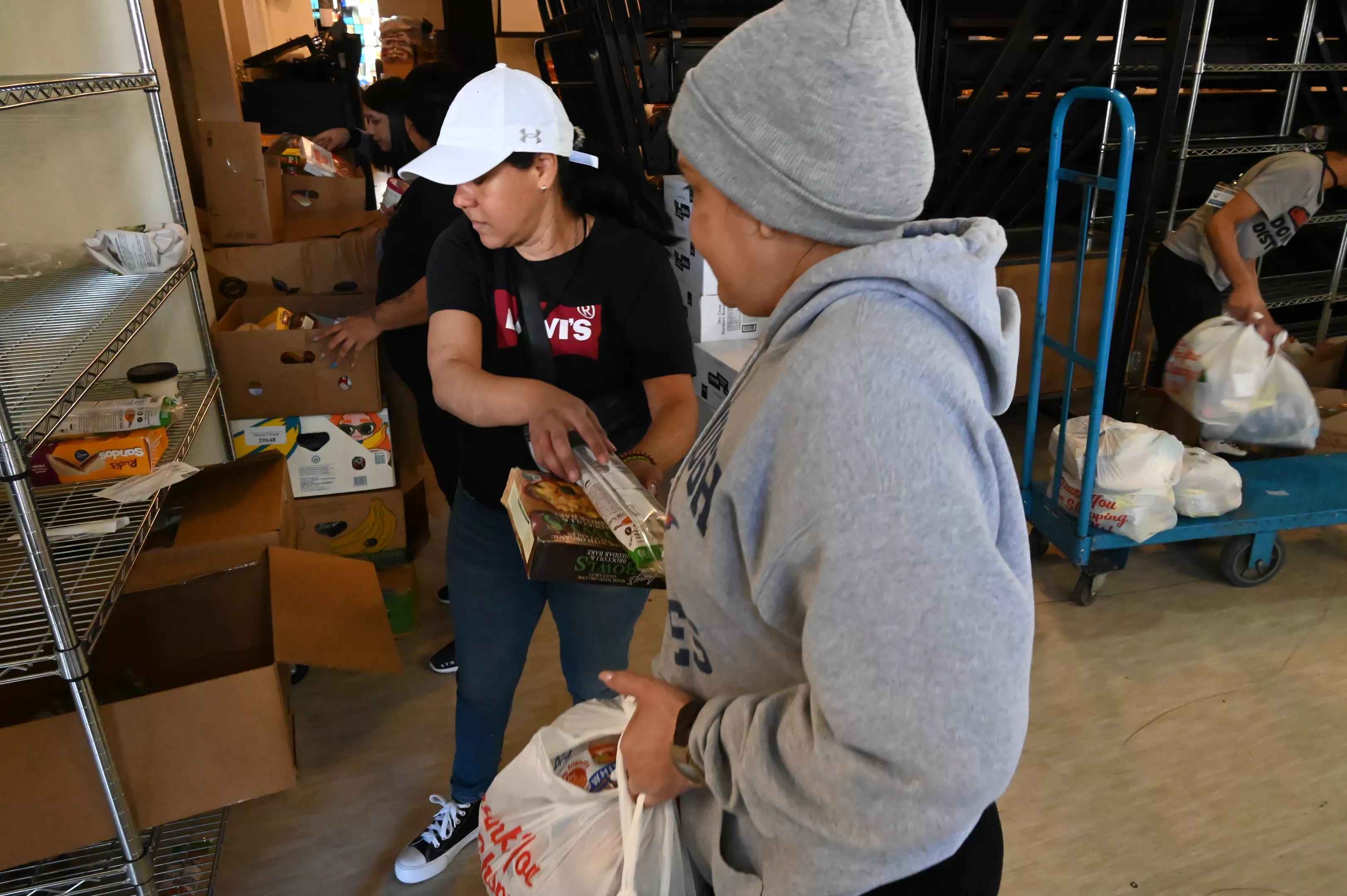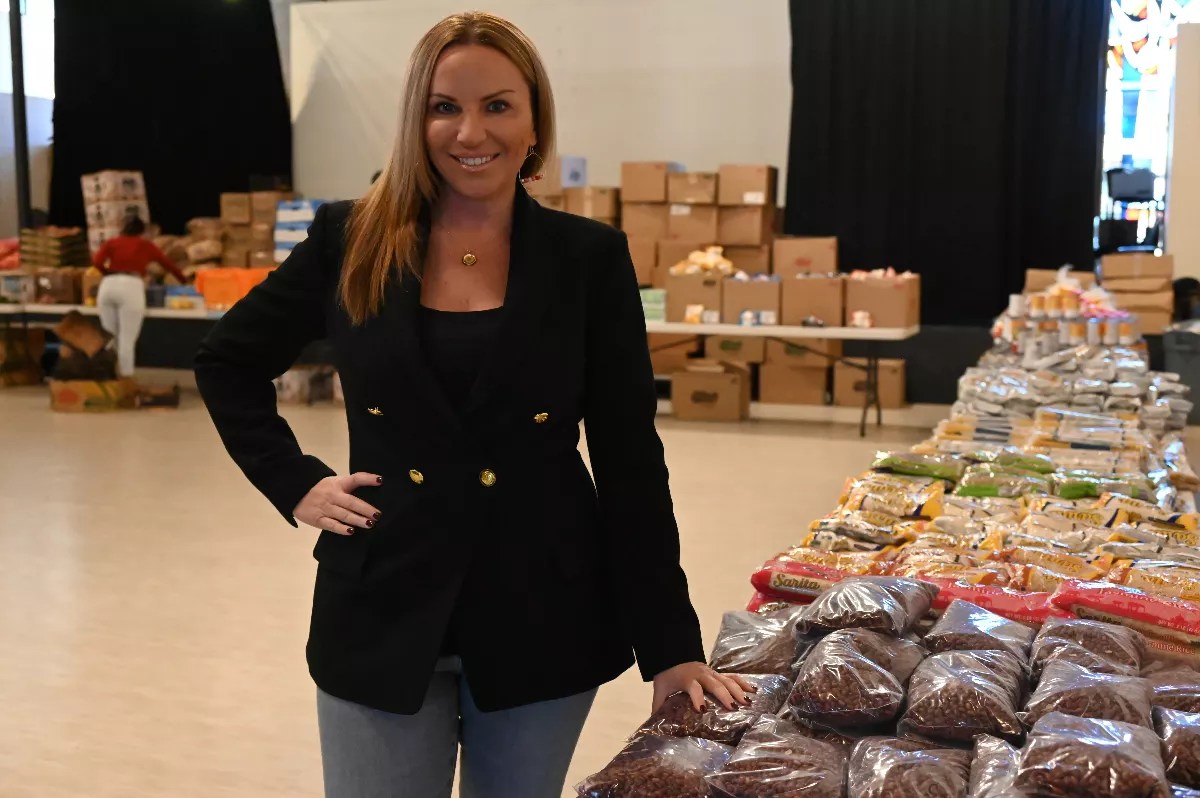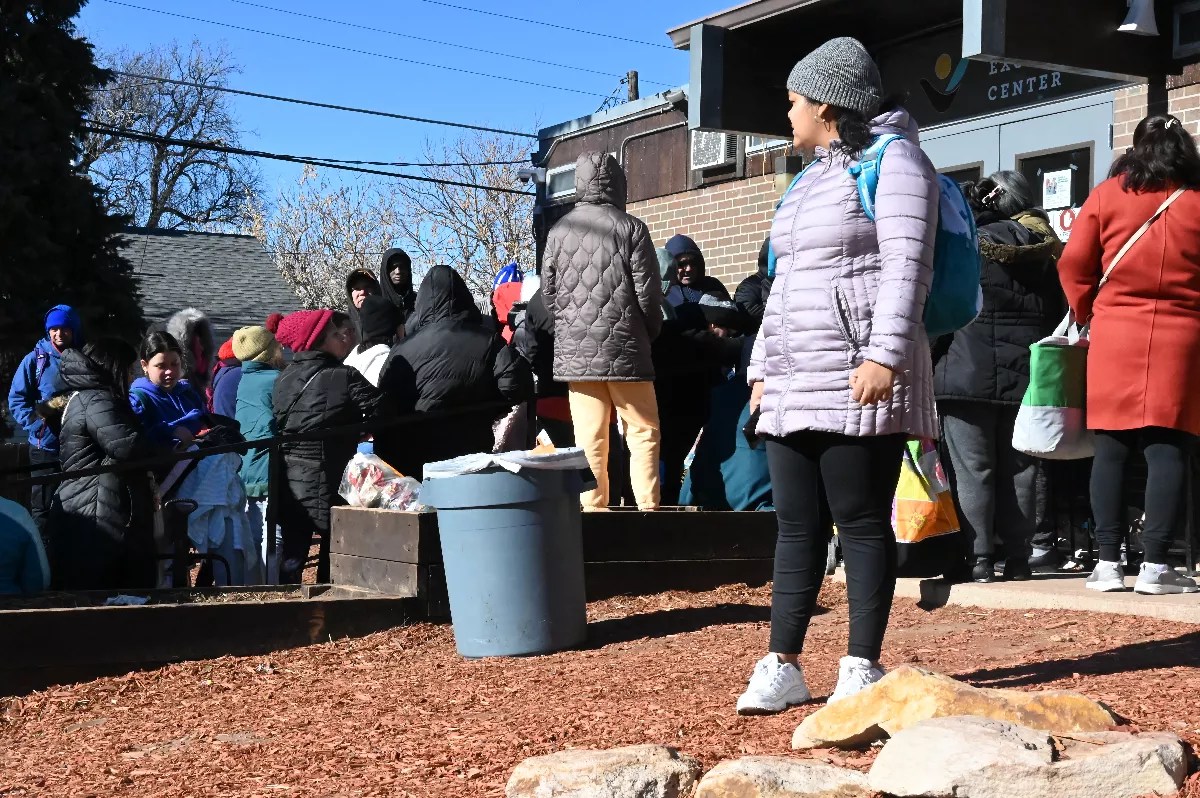
Bennito L. Kelty

Audio By Carbonatix
After weathering an influx of migrants last year, an Aurora nonprofit and food pantry is feeling heavy blowback from President Donald Trump’s administration because it feeds and vaccinates undocumented immigrants.
The Village Exchange Center feeds more than 4,000 people a week out of the nonprofit’s food pantry at 1609 Havana Street. However, executive director Amanda Blaurock says she’s on pace to run out of money needed to feed people by the end of July because she believes VEC has been unfairly deprived of essential federal funding since Trump took office.
Around $3 million in federal funding has been rescinded from VEC within the last month by the Centers for Disease Control and the Federal Emergency Management Agency, which have terminated six grants so far, including one that was pulled on April 1.
“What’s happening nationally is impacting all of us who work with a diversity of individuals,” Blaurock says. “It’s a very difficult time right now to be working with people in vulnerable positions.”
During the past month, VEC has had to lay off staff, cancel health clinics and stop cultural navigation programs that help immigrants find local resources. Those services are ending in response to funding cuts and federal stop-work orders sent to the Colorado Department of Public Health and Environment, which managed federal grants VEC was receiving.
Blaurock says she needs about $74,000 a month to run the food pantry and other services. She’s currently operating “extremely lean,” she says, and is relying more on the $1 million VEC has from donations.
“It’s putting our financial status in a very difficult situation,” Blaurock says, adding that the grant termination letters she received from the federal government explained that the VEC was being cut off because it was providing “funding to people who are now considered ‘illegal.’
“That was the wording used in the letter,” she says.
The stop-work orders and terminated grants stemmed from executive orders signed by Trump, including the “Protecting the American People Against Invasion” policy issued his first day back in office on January 20, which also stopped local legal aid clinics for immigrants in Denver.
Immigrants from countries like Venezuela, Peru, Mexico and Cuba and even some English-speaking Americans filed through VEC’s food pantry on Wednesday, April 2, to pick up milk, bread, eggs, frozen pizzas, carrots and hygiene supplies.
“We get eggs, chicken, sometimes rice. That’s mostly what we get here,” says Eileen Rondon, who moved here from Venezuela. “But anything we need to cook, we try to get here because they usually have it.”

Amanda Blaurock, the executive director of the Village Exchange Center, says that she’s losing millions in critical funding as a result of her organization’s support of undocumented immigrants last year.
Bennito L. Kelty
But Blaurock stresses that VEC is a community food pantry for everyone. While immigrants use the pantry and services the most, she attributes that to the nonprofit being in Aurora – which calls itself “the World in a City” because of its large immigrant population – and not to any VEC mission to help immigrants in particular.
“We work with people who come from 42 different countries of origin that were immigrants, but we also work with the entire community,” she says. “You’ll see people who are white, Black, veterans, everybody here. We always worked with everyone.”
On April 2, families walked out of VEC with plastic bags filled to bursting in both hands, some while pushing babies in strollers, and loaded them in their cars parked up and down the street for blocks.
“I need it because I’m unemployed,” says Rosalba Gil, an immigrant from Colombia. “I can’t go out and buy groceries right now because I’m unemployed, so I started coming here. I’ve come here two times so far to get groceries.”
Blaurock expects VEC will lose another $2 million that she was hoping to receive this year through similar federal grants. The loss comes as the number of people coming to VEC’s food pantry each week has been “steadily rising since the start of the year,” Blaurock adds.
“Now that everything has gone up in price, we try to get most of what we need here,” says Maria Soler, an immigrant from Cuba. “I can find everything I need here, so it would really affect me if they stopped.”
From Bad to Worse: Aurora Targeting Certain Nonprofits
VEC was a cornerstone member of the Aurora Migrant Response Network, a coalition of more than fifty nonprofits that banded together to respond to the influx of West African and South American migrants coming into the city since 2022. Unlike Denver’s elected leaders, the Aurora City Council and Mayor Mike Coffman vowed in February 2024 not to use taxpayer dollars to respond to the migrant crisis, blaming a lack of county-level support.
Aurora elected officials then went from deciding not to fund nonprofit services for migrants to targeting nonprofits with an investigation after a set of local apartment buildings became the focal point of national news and political debates.
In August, an embattled property management company claimed that a Venezuelan gang, Tren de Aragua (TdA), had taken over two of its Aurora apartment buildings. City officials denied the claims as they moved to close both properties for outstanding code violations and unsafe conditions. However, police confirmed gang activity did occur at these apartments, and national headlines and viral videos on social media added to the fervor, which attracted President Trump to the city for a campaign stop in October.
Three days after Trump stopped by, the Aurora, the city council passed a resolution to investigate nonprofits that supported migrants and determine how TdA had arrived in Aurora. Aurora nonprofits, including VEC, said they had no involvement in housing any migrants in the city, but worried the resolution would target them regardless.
“The local politics were dictated by national politics, which is unfortunate,” Blaurock says. “We were seeing national politics play out on a local level and agendas play out that I think were disruptive to our communities here.”

Last year, the Village Exchange Center would have long lines of migrants outside the door of its food pantry.
Bennito L. Kelty
Aurora officials are still trying to attain documents from the City of Denver to complete the city manager’s investigation; the city is even considering suing Denver to get more documents, according to Ryan Luby, an Aurora city spokesperson.
“Our city attorney, Pete Schulte, confirms that Denver still has not produced all records that are responsive to our requests – records that we paid for,” Luby said in a March 25 statement. “Aurora staff have repeatedly asked for updates. Pete says our next step will involve taking Denver to district court to force them to comply with the Colorado Open Records Act.”
A spokesman for the City of Denver says the information that Aurora officials requested could compromise personal privacy. “We’ve provided more than 2,000 documents to Aurora. We cannot redact addresses or personal information which is what they want, because it violates basic rules around privacy,” says Jon Ewing of the City of Denver.
The Aurora Migrant Response Network has since renamed itself Somos Aurora, or “We Are Aurora” in Spanish. At the group’s meeting in February, Blaurock told staff from Democratic Congressman Jason Crow’s office that she expected to lose $5 million in federal funding, a prediction that she’s had to watch come true.
“There has to be action taken by our congressional delegation,” she says. “I mean both sides. The GOP and [Democrats] have to come together and say that they have made a decision from Congress that there were allocations to administer funds across the country, and now there are executive orders revoking all of those decisions. I believe it’s congressional action that has to be taken, or lawsuits.”
On top of dealing with the VEC funding crisis, Blaurock needed help putting out a literal dumpster fire started by an arsonist last week. The fire “could have easily hit the building,” she says, but the fire department was quick to the scene.
A security camera caught the fire igniting inside a dumpster in the alley of VEC’s food pantry, but didn’t capture a clear view of the suspect. With a police investigation underway, she can’t say whether the attack was random or if the arsonist was targeting VEC. Either way, the incident adds to Blaurock’s feeling that her nonprofit is under attack right now.
“It does make us feel very vulnerable and uncomfortable as an organization,” she says. “The executive orders that have been put in place are very confusing for the people that we serve and also our team. So in addition to the fire, having money be terminated has been extremely difficult.”
Blaurock is asking for donations to the Village Exchange Center, which can be made online. Food and hygiene supplies can also be donated directly at 1609 Havana Street in Aurora.
“We are doing everything within our power to address this crisis, including reaching out to potential donors and reorganizing our operations to maintain some level of service,” Blaurock adds. “However, without the support of the community, our efforts may not suffice.”
This article was updated to include a statement from the City of Denver.